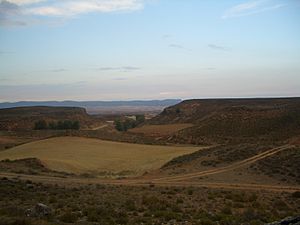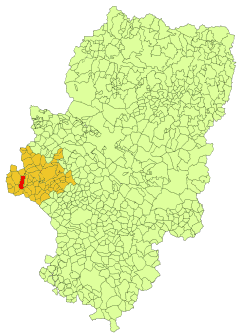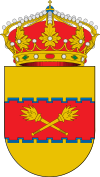Cetina, Aragon facts for kids
Quick facts for kids
Cetina, Aragon
|
|||
|---|---|---|---|
|
Municipality
|
|||
 |
|||
|
|||

Cetina in comarca de Calatayud
|
|||
| Country | |||
| Autonomous community | |||
| Province | Zaragoza | ||
| Comarca | Comunidad de Calatayud | ||
| Municipality | Contamina | ||
| Area | |||
| • Total | 78.76 km2 (30.41 sq mi) | ||
| Elevation | 666 m (2,185 ft) | ||
| Population
(2018)
|
|||
| • Total | 592 | ||
| • Density | 7.517/km2 (19.468/sq mi) | ||
| Time zone | UTC+1 (CET) | ||
| • Summer (DST) | UTC+2 (CEST) | ||
| Website | http://www.cetina.es/ | ||
| refs: | |||
Cetina is a small town in Spain. It is located in the province of Zaragoza, which is part of the Aragon region. The town sits high up at 666 meters (about 2,185 feet) above sea level. It is in the south-east of the province, within an area called the Comunidad de Calatayud. Cetina is about 176 kilometers (109 miles) north-east of Madrid and 98 kilometers (61 miles) south-west of Zaragoza. In 2018, about 592 people lived there.
The name Cetina is also a Spanish surname. It was originally used for people who came from this town.
Contents
History of Cetina
The exact beginnings of Cetina are not fully known. Some experts believe Cetina might be an ancient fort called Certima or Celtima. This fort was built by the Celtiberians, who were ancient people living in Spain. A Roman general named Graco conquered it in 179 CE.
Cetina is located along the famous "Camino del Cid" (Path of El Cid). This path follows the journey of a medieval warrior named El Cid. His real name was Rodrigo Díaz de Vivar. An old poem, "El Cantar de Mio Cid", tells his story. It mentions El Cid passing through this area near the Jalón river. The poem says that El Cid and his men "entered the plain of Torancio, and halted between Ariza and Cetina." They gathered many valuable things as they traveled.
In the late 1100s, Cetina was given its own special set of laws, called a fuero. These laws were granted by Guillén de Belles and Ramón Berenguer IV.
Later, in 1808, during the Peninsular War, French soldiers attacked Cetina. About 18,000 soldiers, led by Marshal Ney, took over the area and looted the town.
Buildings to See in Cetina
The most important building in Cetina is its castle. It stands on a small hill right in the middle of the town. People believe that El Cid captured this castle when he passed through the area.
Inside the castle, there is a chapel. This chapel has beautiful Mudéjar decoration. Mudéjar is a special style of art and architecture. It mixes Christian and Islamic designs. In 1634, a famous 17th-century poet named Francisco de Quevedo got married in this chapel. His wife was Doña Esperanza de Mendoza.
Close to the castle is the parish church of San Juan Bautista. This church was built in the 1400s and is dedicated to Saint John the Baptist.
The Contradanza Dance
The "Contradanza" is a very special folk dance unique to Cetina. It is performed every year on May 19th. This day is the feast day of San Juan Lorenzo. He was a martyr from the 1300s who was born in Cetina.
Nine young men perform the dance. Four of them wear black jackets with white trim. Four others wear white jackets with black trim. The ninth dancer is called "the Devil" and wears a red costume. The dance shows a pretend sacrifice of the devil. The dancers create different shapes with their bodies. A steady, simple tune plays throughout the dance. The Contradanza was first written about in reports from 1751. In 2012, the government of Aragon officially recognized the Contradanza. They declared it a very important part of Aragon's cultural heritage.
Local Festivals (Fiestas)
Cetina celebrates several traditional festivals throughout the year:
- January 17: The feast day of San Antonio.
- May 19: Celebrations for San Juan Lorenzo and Santa Quiteria.
- May 22: A special trip (pilgrimage) to the hermitage of Santa Quiteria.
- October 19: The feast day of Vergen de Atocha.
See also
 In Spanish: Cetina (Zaragoza) para niños
In Spanish: Cetina (Zaragoza) para niños
 | Mary Eliza Mahoney |
 | Susie King Taylor |
 | Ida Gray |
 | Eliza Ann Grier |



